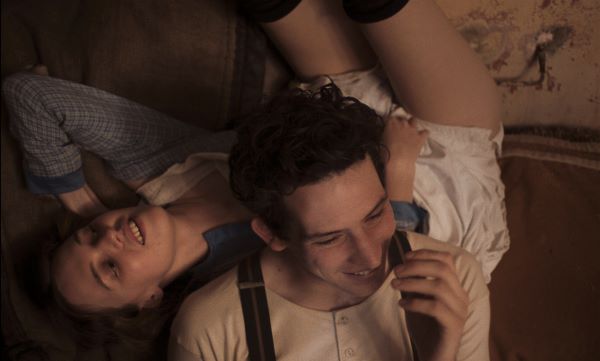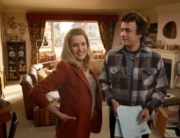French director Eva Husson (Girls of the Sun) makes her English-language feature film debut with a British period drama that subverts the polite conventions of the genre (beautiful sets and costumes; repressed, stiff-upper-lipped aristocratic characters; wily servants) with its frank depiction of sex, including its messiness, as well as its moving meditation on memory, loss, and grief.
Faithfully adapted from Graham Swift’s acclaimed 2016 novel by award-winning screenwriter Alice Birch (Lady Macbeth), the film opens on March 30, 1924, a warm spring day. It’s Mothering Sunday (the British equivalent of Mother’s Day), and Godfrey (Colin Firth) and Clarrie Niven (a brittle Olivia Colman) have given the day off to their cook Milly (an ebullient Patsy Ferran) and housemaid Jane Fairchild (a subtly daring Odessa Young) so they can presumably visit their mothers.
But like her literary forebears Jane Eyre and Jane Fairfax (of Jane Austen’s Emma), Jane is an orphan. When Godfrey asks Jane what she plans to do with her free day, she hesitates to answer until rescued by a phone call from her secret longtime lover. Unbeknownst to the Nivens, Jane has an assignation with the Nivens’ neighbor Paul Sheringham (Josh O’Connor) at his estate while his parents are away. Paul, a law student, has told his parents that he has to study and will later join them and the Nivens for the celebration of his forthcoming marriage to Emma Hobday (Emma D’Arcy), the daughter of other family friends.
It’s this tryst, sensually shot by cinematographer Jamie D. Ramsay, and its aftermath that is at the heart of this languid film. The couple are completely at ease with each other as Paul tenderly undresses Jane in his sun-filled bedroom. As described in the novel and beautifully filmed here, the sunshine illuminates their nakedness matter-of-factly. (O’Connor is given an equal opportunity for full-frontal nudity.) Before Paul leaves to join his parents at the celebratory luncheon, he invites Jane to stay for as long as she likes, and in an amazing sequence, she boldly wanders naked through the lavishly appointed house (kudos to production designer Helen Scott), smokes a cigarette in the Sheringham study, helps herself to a book from the library, and eats a pie and drinks a bottle of beer with gusto in the kitchen.
How this moment of freedom liberates Jane from a lifetime of class-bound service to become a Nobel Prize-winning Doris Lessing–like writer (played in a cameo by Glenda Jackson) is the running theme as the time line shifts back and forth from 1924 to the 1940s to the 1980s. Unfortunately, the later period scenes are not as effective as those set in the 1920s. Barely a presence in the novel, Donald (Sope Dirisu), Jane’s philosopher lover and later husband, is fleshed out, but the relationship feels like more of a distraction, especially when the issue of his race in postwar Britain is never addressed in a historical drama that otherwise pays much attention to period details, especially the class system. The marriage does reveal, though, that Jane is willing to cross not only class boundaries but racial ones as well.
The strongest scenes flit between Paul and Jane’s sexual idyll and his parents’ increasingly emotional luncheon as the audience becomes fully aware of the devastation World War I has wrought on the Nivens and Sheringhams. Paul, the last surviving son of three boys, is to marry his late brother’s fiancée. When Godfrey, bravely trying to exude good cheer, raises a toast to the couple (although Paul still hasn’t arrived, much to Emily’s anger), Clarrie explodes. After almost 10 years, her pain at losing her two sons is still raw.
Aided by Morgan Kibby’s evocative score and Sandy Powell’s exquisite should-be-Oscar-nominated costumes, Husson’s adaptation is abundantly beautiful to look at, yet it lacks the emotional impact of Swift’s novel. For the complete experience, read the book.

















Leave A Comment